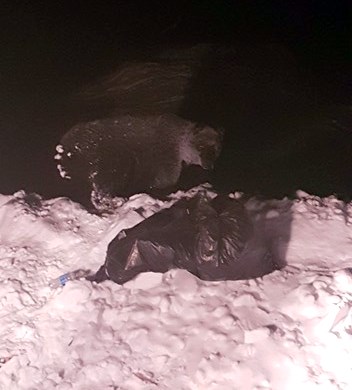EABAMETOONG, Ont. - A black bear sighted out in the frigid temperatures of a northern Ontario First Nations community continues to be spotted, but bear experts say the best thing for the bear is to leave it alone.
Late in December, members of the Eabametoong First Nation attempted to build a den for a black bear that was found wandering near the garbage dump in temperatures as low as -40C.
Clara Wabano, one of the members of the community who wanted to build the den, said there have still been sightings of the bear recently.
Mike McIntosh, the owner of Bear With Us, a charitable organization that rescues and rehabilitates orphaned wild bear cubs, said he has been in contact with members of the community regarding why this bear might be out in such extreme weather conditions.
“Bears are individual animals, so it’s very difficult to generalize,” McIntosh said. “After speaking with a few individuals and asking some questions, I guess you could best assume that the bear may have been out because of some logging cleanup activity nearby.”
There has been a lot of concern for the bear in the community, which sparked the idea to provide it with a den and enticing it with food scraps. However, McIntosh said he advised members of the community to not feed the bear.
“From what I could gather, the bear looked quite healthy,” he said. “He was quite fat and well furred.”
It’s also unlikely the bear would utilize a den made by humans, McIntosh added, because there would be too much human scent around it.
“Bears do not look for dens because they are looking for warmth, they look for dens for security,” McIntosh continued. “They want to be hidden from whatever potential predator might be out there and their only potential predator out there are people.”
Joe Northrup, a research scientist with the Ministry of Natural Resources and Forestry, agrees that it is not a good idea to feed the bear.
“If they continue to feed it, it is probably less likely to hibernate,” he said. “I think it’s a wild animal and should probably be left on its own to do what it’s going to do.”
It is not uncommon for a bear to leave its den during the winter. If the den becomes wet, or the bear is disturbed, it will leave and venture out into the snow.
But Northrup said it is unusual that a bear would continue to be out in such extreme weather.
“It’s definitely not unheard of, but I would say it is highly unusual given the latitude of that area,” he said. “That is very far north for that sort of thing, but certainly not completely unheard of.”
Bears go into hibernation primarily because of reduced food availability, which causes their metabolism to slow down.
However, the effects of the extreme weather on the bear, or why it might be choosing to stay out, is still a not entirely understood.
“Because this is so unusual, there is not a lot of information, or research, or data that’s been conducted on it,” Northrup said. “Without knowing what condition it is in, it’s difficult to tell.”
